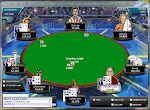The other night, Happy Donkey and I were playing in the $1/$2 No Limit game at Sunset Station when the following hand presented itself: Happy Donkey opened from early position for a $10 raise. A short stack in middle position pushed for $40 and then another reasonably short stack on the button pushed for about $105 total. Happy Donkey thought very briefly and then called the all-ins. He turned over A K off.
Later we discussed the hand and I wasn't thrilled with his call. I have heard a lot of discussion lately about how AK becomes less and less valuable the more people that enter a raised pot ahead of it. Now, of course, the first and most obvious reason for this is the possibility that AK is dominated by AA or KK. But let's set that possibility aside for a moment and focus only on the concept that the more people enter a raised pot, the more likely other Aces and Kings are to be "out" in other players' hands and not available to show up on the board. Barry Greenstein talks about this concept briefly in his book "Ace on the River" and it is worth considering.
I posted this quandary on cardschat.com in order to see what other players had to say about playing AK in a multi-way pot and one user, "zachvac" gave an awesome/informative analysis. I will quote it here in its entirety to preserve the cool train of thought:
This is a concept many people don't seem to understand. Of course it's good to isolate with a hand like AA because I want to be able to put opponents on a range of hands. But I would gladly go all-in PF with 9 other players with AA. Someone said the equity of hands goes down with each person entering the pot. That's false. The equity of AA goes up as each additional player enters the pot.
Let's pretend everyone has 100 chips for simplicity.
From pokerstove: (I'll round)AA vs. single random hand, 85%pot equity = 200*.85 = 170AA in 4-way pot, 64%pot equity = 400*.64 = 256AA in 9-way pot, 33.5%pot equity = 900*.335 = 301.5
Don't know about you, but I'll take the 301.5 chips over the 170 chips on average any day.
Now let's test it for AKo heads up, 65.5%pot equity = 200*.655 = 1314-way pot, 38%pot equity = 400*.38 = 1529-way pot, 18%pot equity = 900*.18 = 162So especially since this is a ring game, you would rather have AKo vs. a random hand 9-way than 2-way. Of course as mentioned this is a random hand. The hands that would push like that are not random hands.
I'm going to be a little bit liberal on the hands they may hold, say TT+, AJs+, KQs, AQo+.heads up: 51.64%pot equity = 200*.5164 = 103.283-way: 30.814%pot equity = 300*.30814 = 92.4224-way: 18%pot equity = 400*.18 = 72. So yes, if you have AKo and think the others are pushing with legitimate hand, not only does your equity decrease, but your ev becomes negative with a straight up PF all-in.
Pot odds may dictate a call anyway, let's look at the example given:
I was thinking of using pokerstove, but it won't give you how often one player will beat another heads up given that the third player has one of the predefined "legit" hands as well. If we consider the side pot ignoring the third hand (meaning if the results come out close we should fold, because we are boosting the value of our hand with every A or K the other person holds.He has to pay $88 to get in on the pot. He wins the side pot 51.64% of the time, $110 in that pot ($55 from him and bigger stack of the 2).110*.5164 = 56.804Main pot is $135 ($45*3), he wins that 30.814% of the time135*.30814 = 41.5989Total win = 56.804 + 41.5989 = ~98.4.He's paying $88 to win an average of $98.40.
Good play based on that criteria of hands, not adjusting to the lesser odds of winning the heads up.
I would love to hear everyone else's opinion on this...so post comments.
Tuesday, October 16, 2007
Subscribe to:
Post Comments (Atom)



2 comments:
I agree with Zac's analysis of the odds and think they are very helpful. But I think that there are two other points that need to be brought up. First, the positive EV in this situation is, at best, very slim. When casinos use odds to determine the house edge in a game, the edge does not need to be large in order for the house to make money. A small edge, compounded over time, and because the house has a virtually unlimited bankroll, will produce great profits. This combination of factors does not exist for poker players. We do not have unlimited bankrolls or unlimited time. Because of that, we need to protect our bankrolls and maximize our advantages. Why settle for getting a large stack in the middle of the table when we have only a small advantage when we can instead wait and commit that cash when we have a larger advantage?
Also, I think that in this particular situation, the call is worsened by the fact that both opponents are all in before the flop. This means #1: Happy Donkey will not be able to get any more money from them should he flop his ace or king. And #2: He will have no fold equity in the situation and no way to bet either player off of their hand.
All-in-all, while I appreciate Zac's statistical analysis, I have to agree with LV Poker Chick on this one and say that I think a fold would have been Donkey's best play.
Happy Donkey here. While I'm glad that I ended up winning the hand, after my discussion with LVPC, I would have to say that I do not think it was the best decision.
Primarily, AT BEST, AK is a coin-flip to a pocket pair. But that is truly AT BEST, and I need to consider what others might be holding or might have mucked. It is very possible that one or more of my outs were already taken, and that changes my odds from a coin-flip to a much bigger disadvantage.
While I still like AK as a starting hand, I have come to apprecaite how much weaker it is than pocket pairs. I'm much less spring loaded to go all in with it and I am much more aware that it is hard to count all of your outs, especially when you're in a multi-way pot.
Post a Comment